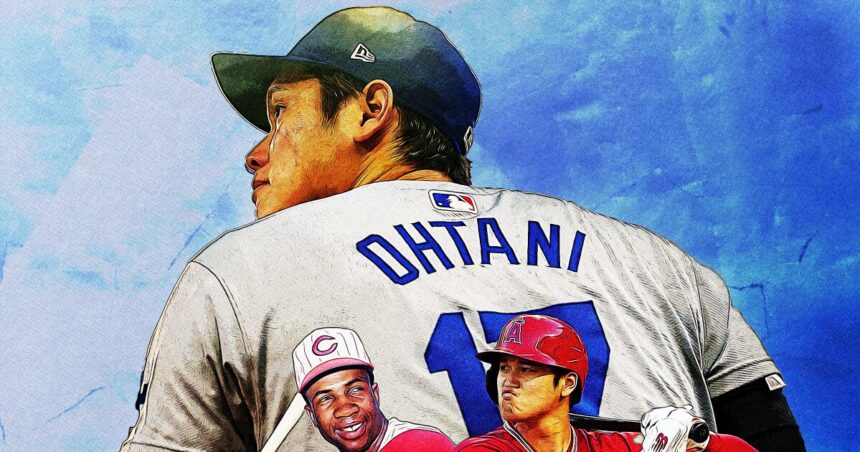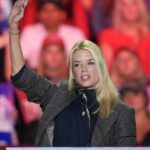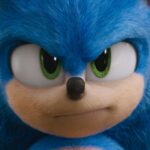The coronation was nothing new.
The narrative that came with it, however, reflected just how much has changed in one year.
For the third time in his decorated Major League Baseball career, won most valuable player honors Thursday, claiming the National League’s top individual accolade by a unanimous vote from 30 members of the Baseball Writers Assn. of America.
While no designated hitter had won an MVP, the award was not a surprise. In his first season with the , Ohtani led the NL in home runs (54), RBIs (130) and on-base-plus-slugging percentage (1.036). He was second in batting average (.310). And with 59 steals, he became the first player in history with a .
Unlike his previous two MVP awards with the , the two-way star didn’t win this one while pitching, limited to hitting this past season after undergoing last year a .
“The fact that I knew I wasn’t going to be able to pitch this season,” Ohtani said through an interpreter, “just made me focus more on my offensive game.”
And the circumstances surrounding Thursday’s announcement that Ohtani won were even more different. There were no looming questions about free agency. No lingering doubts about his lack of postseason experience.
Only one last victorious appearance to bookend a celebratory season for the newest Dodgers star.
“I’m representing the team, winning this award,” Ohtani said on MLB Network, after teammate Clayton Kershaw delivered the announcement.
“I obviously don’t go into the season trying to strive to get the MVP award,” Ohtani added. “I was more focused on being one of the guys with a new team, with the Dodgers. I wanted to embrace the fans, as well, and just let them learn who I was. That was my main focus.”
When Ohtani won his second MVP this time last year, the announcement was surrounded by thick offseason speculation. Ohtani was early in his process as a marquee free agent. He had yet to start meeting with clubs trying to sign him. His future was hanging in the balance.
Fast-forward 12 months, and there were a few constants to be found Thursday — right down to Ohtani’s new interpreter for the announcement, Matt Hidaka (who interpreted for Ohtani during his introductory news conference with the Angels in 2017).
Instead of facing total offseason uncertainty like he did last year, Ohtani was looking ahead to his return to the mound with the Dodgers next year, when he is expected to resume two-way duties as a member of their rotation.
Exactly when Ohtani will retake the mound is unclear. He ended the season needing to check a few more boxes in his recovery from elbow surgery, including facing hitters again in live batting-practice sessions.
“The goal is to be ready for opening day, and that includes hitting and pitching,” Ohtani said. “But we are taking our time, obviously … I think we are going to take a little bit more time and be conservative and we’re going to make sure I’m healthy before I step back on the mound.”
A labrum surgery on his left shoulder this month — resulting from the Ohtani suffered in the — also , leaving his chances of starting during the Dodgers’ to his home country of Japan seemingly slim.
“The goal is to be ready for opening day, and that includes hitting and pitching,” Ohtani said. “But we are taking our time, obviously … I think we are going to take a little bit more time and be conservative and we’re going to make sure I’m healthy before I step back on the mound.”
It’s also unknown how strictly the Dodgers will limit Ohtani’s pitching workload, as they typically do with pitchers returning from major arm surgeries.
What is clear: Ohtani will have a leading role to play in multiple ways for the Dodgers, who are hoping he can replicate some of his dominant offensive form from the past year while also being in position to impact what was a shorthanded staff.
“Right now my focus is to get healthy, come back stronger, get on the mound and show everybody what I can do,” Ohtani said, after laughing off a question about whether he hopes to add a Cy Young Award to his trophy case next year.
It was all a far cry from where Ohtani was last year, as he embarked on a free-agent process that resulted in a .
In hindsight, it’s a decision that worked out for both parties.
En route to helping the — their second since 2020 and first in a full season since 1988 — Ohtani pulled away from all other NL MVP contenders, including New York Mets shortstop Francisco Lindor (who finished second) and Arizona Diamondbacks second baseman Ketel Marte (who finished third).
It made Ohtani the 12th player in MLB history with three or more MVP awards (of that group, only seven-time winner Barry Bonds won a fourth). It made Ohtani the second player in history to win both an AL and NL MVP, joining Frank Robinson’s honors in 1961 (with Cincinnati) and 1966 (with Baltimore). And it marked the 13th time in Dodgers history one of their players won an MVP. Cody Bellinger had been the last to do so in 2019.
The Dodgers’ hope is that more MVPs — and World Series titles — are in Ohtani’s future, as he enters the second year of his 10-year deal with the club.
Other than his pitching rehab, after all, the lack of uncertainties surrounding Ohtani on Thursday reflected just how quickly he has settled with the Dodgers.
It wasn’t his first time winning the honor. But it only added to what has been the most triumphant season of his MLB career yet.
“The next goal,” Ohtani said, “is for me to do it again.”










